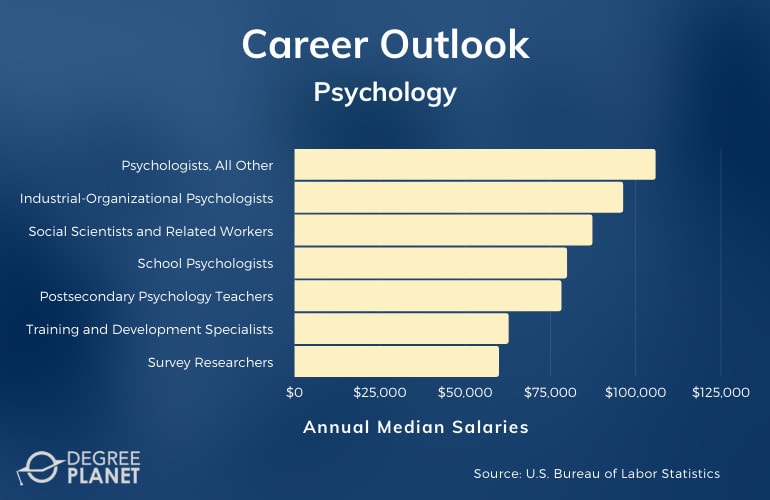With combined masters and PsyD programs, you may earn two graduate degrees in nearly the same timeframe that a doctorate alone would take.

By the time you complete your program, you’ll have both a master’s degree and a psychology doctorate.
Editorial Listing ShortCode:
Your master’s studies can be devoted to psychology as well, or they can be in a complementary field, such as business or education. Either way, a joint degree program could be an important step toward psychology licensure and a career in this rewarding field.
Online Combined Masters and PsyD Programs

Most jobs for practicing psychologists require doctoral training. Often, colleges prefer students to earn a masters degree before beginning doctoral studies.
Earning a masters individually and then a doctorate could mean dedicating more years to school. Combined M.S./Psy.D. programs can help speed up the process so that you can start your professional practice sooner. Plus, during your combined master’s studies, you’ll have the assurance that there’s a doctoral spot waiting for you.
Editorial Listing ShortCode:
Earning two degrees can enhance your learning experiences. Studying psychology at both the master’s and doctoral levels can offer more opportunities to examine research, explore behavior models, gain hands-on experience, and dialogue with classmates and faculty.
Alternative graduate programs for psychology majors, such as joint degrees, could offer a chance to study two different subject areas. Your understanding of an additional field could complement and enhance your understanding of psychology and how psychological principles relate to people’s lives.
Common Joint Master’s and PsyD Programs

Some dual masters and PsyD programs are designed to give you a graduate-level foundation in psychology before you dive into doctoral studies. Other programs provide master’s training in a different field to prepare you for a career in a particular niche.
- MBA / PsyD. Earning both a Master of Business Administration and a Doctor of Psychology could help prepare you for work in the field of industrial organizational psychology. You might take classes that cover project management, finance and accounting, and human development. An I-O psychologist can help organizations maximize their productivity and go through times of transition.
- MEd / PsyD. With a Master of Education and a Doctor of Psychology, you may be prepared for professional partnerships with teachers or community educators. Your knowledge of human learning processes can also help you equip your psychology clients with actionable plans for adjusting their thoughts and behaviors. Course topics might include adolescent psychopathology and educational methods.
- MCJ / PsyD. If you’re interested in working in the criminal justice system, then you may want to consider earning a Master of Criminal Justice and a Doctor of Psychology. Your studies will typically cover topics like criminology, delinquency studies, and behavior therapy. Graduates tend to pursue forensic psychology or police psychology. They may also seek work in a correctional facility.
- MA in Psychology / PsyD. For a career in clinical or counseling psychology, you might find it beneficial to get both a master’s degree and a doctoral degree in that field. The course topics for this combined program can include counseling theories, psychological assessments, and human lifespan development. You may also take pre-clinical courses and complete an internship.
- PsyD / MPH. If your career goal involves providing mental health services to underserved populations, then earning both a Master of Public Health and a Doctor of Psychology could provide valuable insights. Environmental health, family therapy, and equity in healthcare access are topics you’ll likely cover. After graduation, you might work in a community outreach agency or a hospital system.
Other combined master’s and PsyD programs are available as well. You may want to compare various options to find the combination that could provide the best career preparation for you.
Psychology Careers & Salaries

Psychology is a diverse profession. Many psychologists practice as clinical or counseling psychologists. They may help people who have mental health disorders, behavioral disorders, or relationship problems.
Licensure is typically required before using the “psychologist” title and practicing independently. Marriage and family therapy and substance abuse counseling are related professions. Your state may require getting separate licenses before offering those services.
Some psychologists work in schools to support students who have emotional or behavioral disorders. They can also develop intervention plans to help struggling students succeed in the classroom.
According to the Bureau of Labor Statistics, the median annual salary for psychologists is $82,180.
| Careers | Annual Median Salaries |
| Psychologists, All Other | $105,780 |
| Industrial-Organizational Psychologists | $96,270 |
| Social Scientists and Related Workers | $87,260 |
| Clinical, Counseling, and School Psychologists | $79,820 |
| Postsecondary Psychology Teachers | $78,180 |
| Training and Development Specialists | $62,700 |
| Survey Researchers | $59,870 |
| Probation Officers and Correctional Treatment Specialists | $55,690 |
| Marriage and Family Therapists | $51,340 |
| Substance Abuse, Behavioral Disorder, and Mental Health Counselors | $47,660 |
Salaries with a combined PsyD can vary greatly. Your personal earnings may depend on your experience and the cost of living in your community.
Studying both business and psychology can be helpful preparation for a career as an industrial-organizational psychologist. An I-O psychologist may work in-house for a company or serve as an independent consultant. Working in employee training and development could be another option for I-O professionals.
Editorial Listing ShortCode:
A background in criminal justice may lead to a career in law enforcement or the court systems. Some psychologists testify in court as expert witnesses. Others coordinate treatment plans for correctional facility inmates.
In addition to working as practitioners, psychologists can also have careers in research and academia. Some are psychology professors. Others work as social scientists or gather data as survey researchers.
Combined Masters and PsyD Curriculum & Courses

The curriculum for your combined studies will depend on your master’s field, but you may take courses like the following:
- Business Leadership: The principles of leading and managing teams in business settings may prove useful in other environments as well.
- Criminological Theory: You can explore the latest research on factors that contribute to criminal behavior.
- Group Dynamics: Understanding interpersonal relationships can help you lead discussion groups, counseling sessions, and professional teams.
- Health Promotion: Your time in this course can equip you with resources for educating people and encouraging healthy choices.
- Human Lifespan Development: This class can increase your knowledge of physical, cognitive, and emotional growth from birth through old age.
- Law and Ethics for Psychologists: Legal regulations and your ethical code should guide your professional decisions.
- Measurements and Assessments: You’ll learn to conduct psychological tests that can provide information about your clients and their progress.
- Preparing for Clinical Experiences: In one or more courses, you’ll learn vital skills for working with kids, teens, and adults in a variety of clinical settings.
- Psychology Research Methods: In preparation for implementing research-based practices or writing a dissertation, this class will introduce you to research skills used in the field of psychology.
- Understanding Diversity: By paying attention to your clients’ diverse backgrounds and worldviews, you can gain greater insights into people’s patterns of thought and behavior.
For a joint program, you might take master’s and doctoral courses concurrently or earn one degree and then move on to the other.
Dual Masters and PsyD Admissions Requirements

Being admitted for joint studies may require applying to both the master’s program and the doctoral program. To determine whether you’re a good candidate for the rigor of combined studies, there may be specific application requirements:
- Bachelor’s degree, preferably with a psychology major or prerequisite courses
- Criminal background check
- Essay about your interest in earning two degrees
- Interview with faculty members
In addition, you’ll submit standard application materials, such as transcripts, professional references, a resume, and, in some cases, GRE or GMAT scores.
Accreditation

Regional accreditation is a distinction given to colleges that meet certain standards. It’s optional, but nearly all reputable schools apply for it. By choosing an accredited school, you can know that you’re going to receive a good education.
There are a number of benefits to attending an accredited school. Federal financial aid can only be used at accredited schools. Regional accreditation can also make it easier to transfer your coursework to another institution. You may need an accredited degree to apply for licensure. Employers also prefer degrees from accredited colleges.
American Psychological Association (APA) Accreditation
Regional accreditation applies to the entire college. Programmatic accreditation is given to certain programs or departments.
In the field of psychology, programmatic accreditation is granted by the American Psychological Association (APA). This organization accredits doctoral and postdoctoral programs as well as internships.
Editorial Listing ShortCode:
By earning your PsyD in a program with APA accreditation, you can rest assured that your program meets current standards for psychology training and practice. Some states also require that licensure applicants hold APA accredited degrees.
PsyD Licensure and Certifications

In most states, psychologists need to be licensed for independent practice. The process of obtaining licensure commonly includes these steps:
- Doctoral program. Enroll in a doctoral program in psychology, preferably one accredited by the APA.
- Internship. Complete an approved internship before graduation.
- Work experience log. Maintain a log of clinical experiences, both during school and after.
- EPPP exam. Receive a passing score on your state’s psychology examination, typically the Examination for Professional Practice in Psychology (EPPP).
- Supervised clinical experience. Gain postdoc clinical experience in a supervised setting.
- Licensure application. Pay a fee and apply for licensure with your state’s psychology board.
Licensure requirements vary by state, so you can consult your state’s licensing board for specific criteria.
Financial Aid and Scholarships

With a combined degree program, you may save somewhat compared to the cost of completing two separate degrees. If you qualify, financial aid can help as well. As a first step to exploring financial assistance, you can fill out the Free Application for Federal Student Aid (FAFSA).
Government assistance can be available through state or federal programs. Graduate students are most likely to receive loans. Grants may be offered in select circumstances. Scholarships and fellowships through the college or outside organizations can also cover a portion of the cost. Some are renewable for multiple years.
Many colleges waive doctoral students’ tuition and provide stipends in exchange for work. Teaching undergraduate classes is a common assignment, but some doctoral candidates may serve as research assistants. If you maintain a full-time job while earning your degrees, you can also check to see if your employer offers tuition reimbursement.
Do You Need a Masters to Get a PsyD?

Whether you need to have a master’s degree before getting a psychology doctorate depends on the school.
Some programs are open to students with only a bachelor’s degree. Those students may have to take some additional classes as a bridge between undergraduate and doctoral studies. Other institutions require students to have master’s degrees first. More specifically, applicants may need to hold graduate degrees in fields related to psychology.
One advantage to earning a master’s degree first is that you can get a taste of what grad school is like. It’s a smaller commitment since masters programs are typically shorter than doctoral ones.
Can I Get My Masters and PsyD at the Same Time?

Yes, some colleges have PsyD clinical psychology programs that are paired with masters degrees. In some cases, you’ll study clinical psychology at both the masters and doctoral levels.
In other cases, you’ll do doctoral studies in psychology, but your master’s program will be in a different field. Combining two different areas of study can prepare you to work in a particular psychology niche.
Editorial Listing ShortCode:
At some schools, you’ll earn your master’s first and then advance to the doctoral program. Other schools will have you begin with doctoral studies before adding in courses from your second department.
What Can You Do with a Combined Masters and PsyD?

Many psychology graduates work as clinical or counseling psychologists. According to the Bureau of Labor Statistics, the average annual income for that field is $79,820.
Psychology positions may be available through government agencies or hospitals. Some psychologists specialize in particular services, such as marriage therapy, child psychology, substance abuse recovery, or mental health treatment.
Other graduates coordinate workplace training and development or serve as industrial-organizational psychology consultants. I-O psychologists earn a median salary of $96,270 annually. Psychologists who have also studied criminal justice can develop correctional treatment plans or work as psychology consultants for police forces.
How Long Does It Take to Get a PsyD After a Masters?

If you already have a master’s degree, you may spend another 3 to 5 years studying for a doctorate in a full time program. A growing number of universities offer part time PsyD programs, which will take longer to complete than full time ones.
Getting a PsyD usually involves earning 100 or more credits. There’s often a 1 year internship involved as well. Programs without dissertation requirements can usually be finished in about 3 years with full-time study. These are often the fastest online psychology degrees you can get at the doctorate level.
Working on a dissertation can add a few more years to a program’s length. Some colleges set a maximum timeframe for the PsyD program, such as 7 years.
How Long Does It Take to Get a Combined PsyD and Masters Online?

Combined masters and PsyD programs typically take 4 to 6 years to complete, depending on the university and your chosen specialty. The average length of these programs is usually around 5 years.
Combined programs generally require at least 130 credit hours. Different masters specializations have different credit requirements. You may complete internships and other clinical experiences in both the masters and doctoral portions of your program. There may be a capstone project or a dissertation as well.
What’s the Difference Between a PsyD vs. PhD in Psychology?
There are two different paths to a doctoral degree in psychology: a Doctor of Psychology (PsyD) or a Doctor of Philosophy (PhD) in Psychology.
| PsyD | PhD in Psychology |
|
|
Both degree types can be accredited by the APA.
What’s the Difference Between a PsyD vs. MD?
If you want a career that’s focused on helping people be healthy and whole, you may opt to become a Doctor of Medicine (MD) or a Doctor of Psychology (PsyD).
| PsyD | MD |
|
|
Even though these fields are different, both types of professionals are called doctors.
Is a Combined Masters/PsyD Worth It?

Yes, a combined masters/PsyD is worth it for many professionals. Earning 2 degrees can expand your field of expertise and prepare you for specialized career tracks.
The Bureau of Labor Statistics says that job growth for psychology positions is expected to increase 3% over the next decade, which is on par with the national average for all occupations.
Editorial Listing ShortCode:
Your dual degrees may position you as a competitive candidate for some positions. For example, the Bureau of Labor Statistics predicts tough competition for IO psychology jobs, so an MBA/PsyD background could help an application stand out.
Universities Offering Combined Masters and PsyD Degree Programs
Methodology: The following school list is in alphabetical order. To be included, a college or university must be regionally accredited.

Appalachian State University offers an on-campus Doctor of Psychology program with an en route Master of Arts in Psychology for those interested in working in a rural area. Those interested in the program must have a GPA of 3.0 and submit GRE scores, 3 letters of reference, a curriculum vitae, and a personal statement.
Appalachian State University is accredited by the Commission on Colleges of the Southern Association of Colleges and Schools.

George Washington University offers a Doctor of Psychology in Clinical Psychology. Students may also complete a Master of Psychology at the same time if they have completed 53 credits for the Doctor of Psychology with a GPA of 3.0 or higher. Applicants must submit 3 recommendation letters and official transcripts and complete an interview.
George Washington University is accredited by the Middle States Commission on Higher Education.

Loyola University of Maryland offers a combined Master of Science and Doctor of Psychology in Clinical Psychology. The program is designed to last for 5 years and requires 124 credit hours, a dissertation, and an internship to graduate. Applicants must submit 3 letters of recommendation, official transcripts, and an essay.
Loyola University Maryland is accredited by the Middle States Commission on Higher Education.

Mercer University offers a combination program to earn a Doctor of Psychology in Clinical Psychology and a Master of Public Health. The program can typically be completed in 5 years and requires 40 hours of experience in public health services. Applicants must have an undergraduate degree with a GPA of 3.0 to be eligible for the program.
Mercer University is accredited by the Southern Association of Colleges and Schools Commission on Colleges.

National University offers a dual degree program for a Master of Arts in Sport Psychology and a Doctor of Clinical Psychology. The program can usually be completed in 5 years. The Clinical Psychology courses are offered online, and the Sport of Psychology courses are on campus. Applicants must complete an online application to apply.
National University is accredited by the WASC Senior College and University Commission.

Regent University offers a Master and Doctor of Psychology degree program. It takes 5 years to complete. To graduate, students must complete 124 semester hours, 2000 internship hours, and a dissertation. Applicants must have a bachelor’s degree with 18 credits in psychology and a minimum GPA of 3.0.
Regent University is accredited by the Southern Association of Colleges and Schools Commission on Colleges.

Rutgers University offers a Doctor of Psychology and Master of Public Health dual degree program.
It usually takes 5 to 6 years to complete and can only be completed on campus. Those interested in the program must first be accepted into the Rutgers Graduate School of Applied and Professional Psychology. Then they must discuss a transfer into the program with the program contact.
Rutgers is accredited by the Middle States Commission on Higher Education.

The University of St. Thomas offers a Master of Arts in Counseling Psychology with direct admission to the Doctor of Counseling Psychology program.
Students must complete 129 credits and an internship to obtain both degrees. Applicants must submit GRE scores, 3 letters of recommendation, a writing sample, a statement of purpose, and a resume.
The University of St. Thomas is accredited by the Higher Learning Commission.

Widener University offers a dual degree program for a Doctorate of Psychology and a Master of Business Administration.
The program can typically be completed in 5 years on campus, with students taking additional classes in the evening and summer. Those interested in the program must first be accepted into the PsyD program and then submit an essay and complete an interview to be eligible for the dual degree program.
Widener University is accredited by the Middle States Association of Colleges and Schools.

William James College gives students in their Clinical Psychology Doctoral program the opportunity to work towards a Master of Arts in Professional Psychology at the same time.
Students must complete an additional 47 credits to graduate. Applicants must have an undergraduate degree with a GPA of 3.0 or higher, submit an essay, and complete an interview.
William James College is accredited by the New England Commission of Higher Education.
Earning Your Combined Masters and PsyD Online

If you have your sights fixed on becoming a licensed psychologist, most states require a doctorate in psychology for license eligibility.
In addition to a PsyD, you might also want to get a masters degree. Luckily, there are universities that offer dual masters and doctorate degree programs online. Through masters studies, you can either learn more about psychology or explore another field. Completing both degrees at the same time can even be a time-saving move.
Getting two degrees can take several years, but you don’t have to put the rest of your life on hold. Combined masters and PsyD online programs tend to be highly flexible, much like the combined masters and PhD programs in psychology online that some universities offer.
Also, just so you know, there are universities that offer dual master’s degree programs online, in which you earn two master’s degrees.
So you may want to explore the many degree combinations that are offered by accredited colleges.

